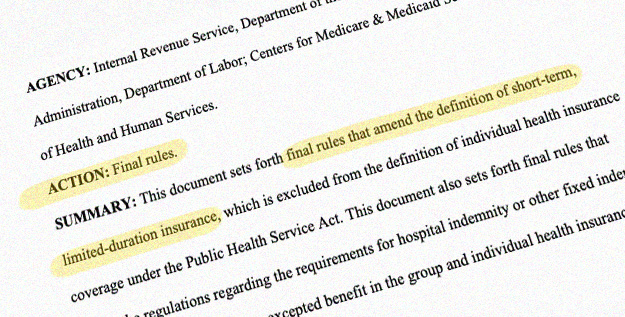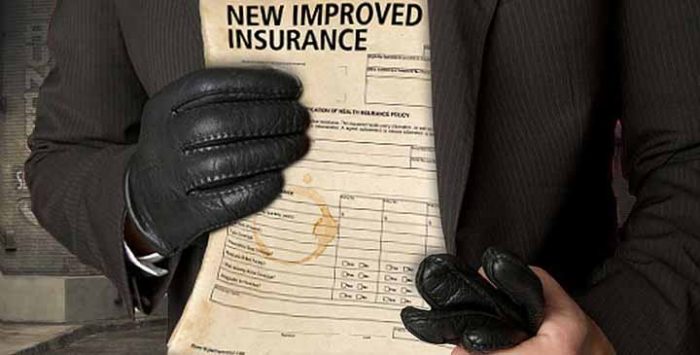Key takeaways
- What are some of the most common health insurance scams?
- What are the warning signs of a health insurance scam?
- Will my health insurance agent ask for personal health or financial information?
- Understand your state’s health insurance exchange
- Be wary of scams involving medical discount plans
- How does the government protect people from health insurance scams?
- How can I report a suspected health insurance scam?
Health insurance scams – schemes that target consumers seeking health insurance coverage – are often focused on identity theft. Prominent agencies – among them the Federal Trade Commission (FTC), Better Business Bureau (a non-governmental, non-profit organization) and the Department of Health and Human Services, which operates HealthCare.gov – have issued warnings about criminal attempts to get consumers to divulge personal information.
Unfortunately, the volume of scams tends to increase significantly in the fall, coinciding with open enrollment for Medicare, ACA-compliant coverage, and many employer-sponsored health plans.1 Here are some FAQs and tips to help you avoid health insurance scams:
What are some of the most common health insurance scams?
Identity theft scams are not the only health insurance scams causing federal agencies, like the FTC, to issue warnings. Other examples include:2
- Someone who contacts you by phone, text, or email and requests personal information in exchange for a health insurance quote.
- Individuals who offer to help you find health insurance on the Marketplace but for a fee (cash, wire transfer, crypto, etc.).
- Medical discount plans or healthcare sharing ministry plans disguised by a salesperson as health insurance.3
- An unscrupulous agent who collects money from a client but does not send it to the insurance company or complete the enrollment.3
- A sales pitch to buy fake health insurance that is either a limited benefit plan or doesn’t exist.4
What are the warning signs of a health insurance scam?
The warning signs of a health insurance scam include:2
- High-pressure sales techniques. (Being told you should “act now” instead of taking time to think carefully about your transaction.)
- Vague answers when you ask questions.
- Unsolicited callers asking you to divulge personal information.
- Being asked to pay for assistance with Marketplace enrollment.
- An agent (or someone claiming to be an agent) who asks you for cash or a blank check to pay the premium.2
Learn about steps you can take to avoid Medicare fraud.
Will my health insurance agent ask for personal health or financial information?
Yes. Although you should be wary of unsolicited callers who ask for any personal information, you will need to provide a variety of personal information to the person who is helping you enroll in health coverage, if you choose to use assistance with that process.
A reputable health insurance agent (for individual/family coverage or Medicare) will ask you questions about your medical needs, including details about the doctors you want to be able to see as well as any prescription drugs you take and any medical procedures you have planned. They need this information to be able to recommend a plan that will have your doctors in-network, include your prescriptions on its formulary (covered drug list), and have out-of-pocket costs that are manageable for you. You are not required to provide these details, but they’ll help the agent make the best-informed plan recommendation for you.
If you’re enrolling in individual/family coverage through HealthCare.gov (the exchange or Marketplace), you’ll have to provide relatively extensive personal information, including your Social Security number (you can get quotes without providing any identifying information, but you’ll need to provide those details in order to enroll). If you’re applying for premium subsidies (which will have to be reconciled on your tax return), you’ll need to provide financial information as well.
There’s no legitimate way to enroll in just a minute or two with nothing more than a name and Social Security number, so be wary of potential scams in which the salesperson is attempting to gather very basic – but personal – information under the pretense of quickly enrolling you in health coverage.
Understand your state’s health insurance exchange
In addition to outright scams like identity theft, consumers need to be aware of the possibility that some agents might try to portray their agency as “the exchange” and attract customers who think they’re purchasing coverage through their state’s official exchange. This is further complicated by the fact that licensed agents and brokers who are certified by a state’s exchange are an important resource for consumers who are enrolling in exchange plans.
Consumers can purchase ACA-compliant individual policies outside of the exchanges (purchased directly from the health insurance company, with or without the help of an agent). Like exchange plans, these off-exchange plans are ACA-qualified, which means they are guaranteed issue, cover the essential health benefits, and have the ACA’s limits on out-of-pocket maximums (no more than $9,450 for an individual in 2024).5
From a consumer perspective, the primary difference between exchange and non-exchange plans is the availability of subsidies. Premium subsidies and cost-sharing subsidies are only available on plans that are purchased through an exchange. Each state has just one official exchange where subsidies are available. In 2024, it’s HealthCare.gov in 32 states.
If you’re in Washington, D.C. or one of the 18 states that runs its own exchange, you can still use HealthCare.gov to get to the exchange website in your state so that there’s no doubt you’re on the correct site. If a certified broker or agent assists you with your exchange plan application, you will still be submitting your application on the official exchange website (unless the broker uses an enhanced direct enrollment website, discussed in a moment). If you’re submitting an application anywhere else, you’re applying for an off-exchange plan and subsidies will not be available.
It’s important to understand that there are approved enhanced direct enrollment entities (EDE) that are authorized to enroll people in on-exchange plans via their own websites, without having to use the actual exchange website. The Centers for Medicare & Medicaid Services (CMS) has a list of entities that are approved to provide direct enrollment.
But if you’re using one of them, you’ll still want to confirm that you’re enrolling in an on-exchange plan – if that’s your preference – since these entities can generally also offer you the option of enrolling off-exchange.
Be wary of scams involving medical discount plans
Some marketers offer discount medical plans, which provide discounts on certain expenses such as prescription drug costs and dental services through a network of providers. In some cases, however, unscrupulous marketers are overstating the size of those networks, or promising discounts “up to” an unrealistic certain percentage.
The FTC notes that the actual savings with a medical discount plan “typically are a lot less than promised.” In some cases, consumers are being drawn into those plans on the false promise that the discount programs will pay for major medical expenses.
The most important thing for you to know about these plans is that they’re not health insurance. And, if you’re hoping they’ll substantially lower your medical costs, you need to get detailed information about discount limits, covered costs and participating providers – before you buy the plan – to avoid costly surprises later on.
How does the government protect people from health insurance scams?
The FTC and state insurance departments work year-round to detect and prevent health insurance scams. The federal government has extensive marketing rules for private Medicare Advantage and Medicare Part D prescription drug plans designed to protect consumers.6 Legitimate health insurance companies and agents/brokers must be licensed with the state insurance department, which oversees their actions and can revoke licensure if necessary.
Since the fall of 2023, agents and brokers assisting with enrollments in states that use HealthCare.gov have been required to document that the enrollee has consented to the assistance, and must maintain a record of the consent for ten years.7
HHS noted that the need for documented consent was due in part to “complaints alleging enrollments by agents, brokers, and web-brokers that occurred without the consumer’s consent,”7 so this adds another layer of protection to prevent health insurance scams.
If in doubt, there are state and federal government resources to help ensure that you’re dealing with a legitimate representative and health plan. Your state insurance commissioner, state Medicaid agency, Medicare.gov, and the Medicare Rights Center are all good places to start.
Take your time, compare all of the available plans, seek help from a reputable source, and be sure that you read the fine print on the plans you’re considering before you enroll.
How can I report a suspected health insurance scam?
You can report a suspected health insurance scam to the Federal Trade Commission (FTC) or your state’s insurance department. If the suspected scam involves Medicare, you can report it to 1-800-MEDICARE or contact your state’s Senior Medicare Patrol.
Louise Norris is an individual health insurance broker who has been writing about health insurance and health reform since 2006. She has written dozens of opinions and educational pieces about the Affordable Care Act for healthinsurance.org.
Footnotes
- “Health Care Scams Tend to Spike During Open Enrollment” Federal Communications Commission. Accessed December 2023 ⤶
- “Spot Health Insurance Scams” Federal Trade Commission. Accessed January 2024 ⤶ ⤶ ⤶
- “Insurance Fraud” National Association of Insurance Commissioners. June 2023 ⤶ ⤶
- “Beware of fake health plans” DC Department of Insurance, Securities, and Banking. Accessed January 2024 ⤶
- “Premium Adjustment Percentage, Maximum Annual Limitation on Cost Sharing, Reduced Maximum Annual Limitation on Cost Sharing, and Required Contribution Percentage for the 2024 Benefit Year” Centers for Medicare & Medicaid Services, December 2022 ⤶
- “Medicare Marketing Violations and Misleading Marketing” Medicare Patrol, Accessed December 2023 ⤶
- “Patient Protection and Affordable Care Act, HHS Notice of Benefit and Payment Parameters for 2024” U.S. Department of Health and Human Services, April 2023 ⤶ ⤶








